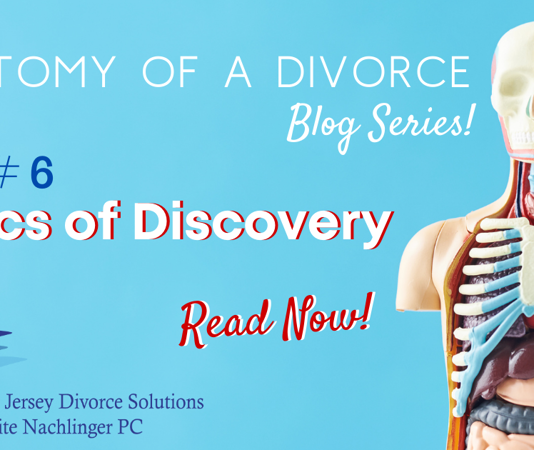Anatomy of a Divorce Series Part 6: Basics of Discovery

You will often hear your attorney refer to “discovery” and have only a vague understanding of what that is. It’s ok. It’s not your job to know that, but you should have a little sense of what it is so that you understand enough about what’s going on to make informed decisions about your case.
Discovery is generally a period of time in any litigation (in this case, a divorce) during which the parties/attorneys are permitted to seek out information necessary to resolve issues in the case or provide evidence that may be needed if there is a trial.
Discovery can generally be considered a process by which information is sought out and exchanged. It would be impossible to teach you everything about discovery here, but these are the basics.
Some examples of Discovery:
- This is a fancy word for “questions.” It’s a long list (usually very, very long – could be 100 pages long) of questions, which usually have numerous sub-questions. It’s really not fun to fill out and you may feel like it’s a total waste of time. You may be thinking, “Why are they asking all of this? They already know the answers to these questions.” But part of the reason for this in the game of litigation is to pin you down on an answer. It’s hard for you (or the other party) if you provide one answer in your answers to Interrogatories, and then give a different answer later.
- Notice to Produce. A Notice to Produce generally accompanies the Interrogatories. It’s a list of items you are asked to “produce” such as documents (usually documents) but it could be other things like a computer or other tangible items.
- These are a request for someone to produce documents. The Notice to Produce is usually served on one of the parties (i.e. you or your spouse). A Subpoena is usually served on a third party (i.e. someone other than you or your spouse; someone who is not a party to the litigation). This is normally to produce documents e.g. bank records, employment records, a police report, etc. There are strategic reasons to serve Subpoenas so they may not happen in every case. If you think a Subpoena should be served in your case, this is something you should discuss with your attorney as it should fit in with your overall litigation strategy.
- This is essentially an opportunity for your attorney to question a witness in a setting in which he or she is under oath and his/her attorney cannot assist him in answering questions. The witness could be either of the parties or other third parties. This may have some usefulness in your case, particularly if your attorney wants to pin someone down on facts and circumstances that are essential to the case, or ask follow up questions in a more formal setting that could not be adequately addressed with Interrogatories. Keep in mind that a deposition is not an opportunity to make a witness or party be inconvenienced or uncomfortable. The subject matter of the deposition has to be relevant to the case. It’s less typical that depositions are conducted in divorce cases, particularly cases that do not involve complex issues. However, there are times when they are appropriate and necessary. This should also be considered in the overall strategy of your case.
- There are times when an issue requires an expert opinion. This could be on a financial issue such as whether someone is employable or how much money they could make (a vocational expert), how much a business is worth and/or how much income it generates (a forensic accounting expert), what the parties’ marital lifestyle was (an accounting expert), or how much artwork or other tangible items are worth (expert specific to that industry), or most commonly, what type of custody arrangement is in the children’s best interests (a psychological expert who conducts custody evaluations). These are experts that are usually very costly, their work is time-consuming, and they should be involved in the case as early as possible. These will not be necessary in every case, but when they are necessary, it’s essential that they are retained to make sure you are in the most advantageous position possible.
This is not an exhaustive list of all of the discovery mechanisms at your disposal, but it’s a brief description of the most common ones. Discovery is an essential part of any divorce and it’s important that it is done correctly. There are specific Court Rules that must be followed to obtain discovery. Not complying with discovery requested of you can have serious adverse implications on your case.
If you need further assistance navigating your divorce, the best advice is to retain an attorney to do that for you.
If you are concerned about how your case is being handled and want to consult with an attorney, or if you decided to handle your divorce yourself and have realized you are in over your head, schedule a Client Vision Meeting by calling us at 732-529-6937. Or you can schedule it right
